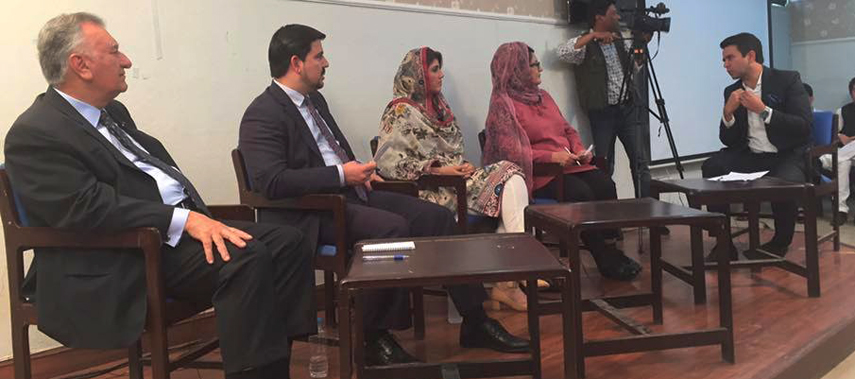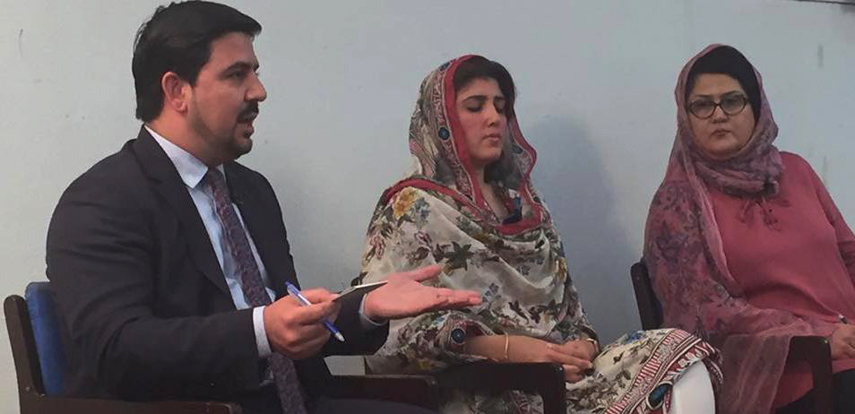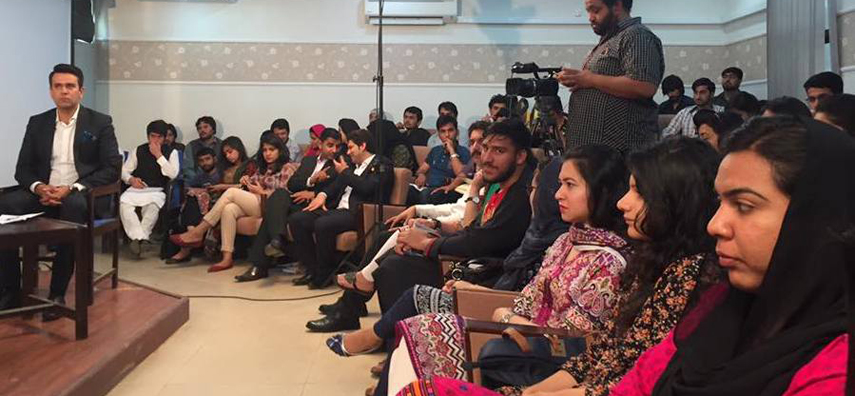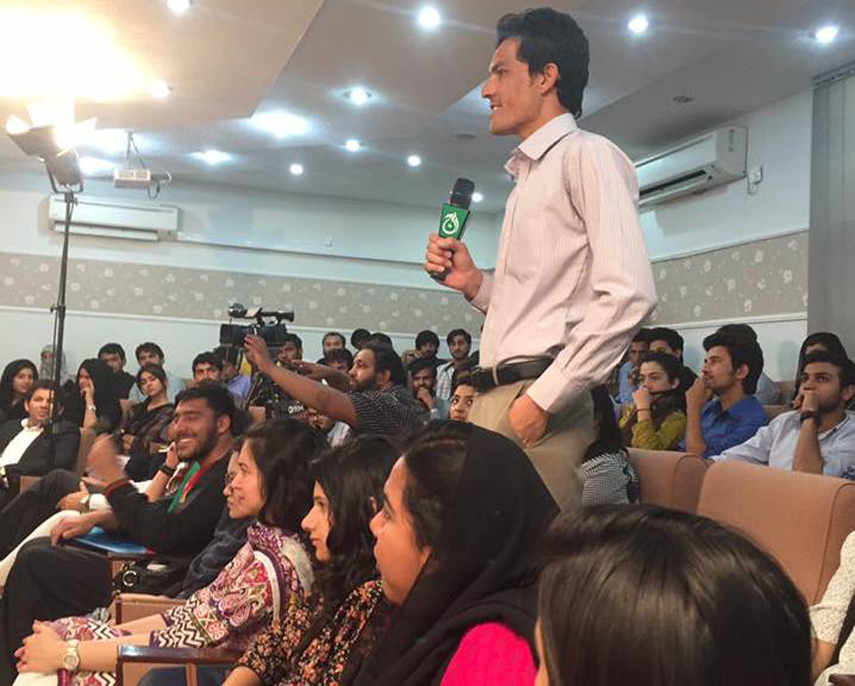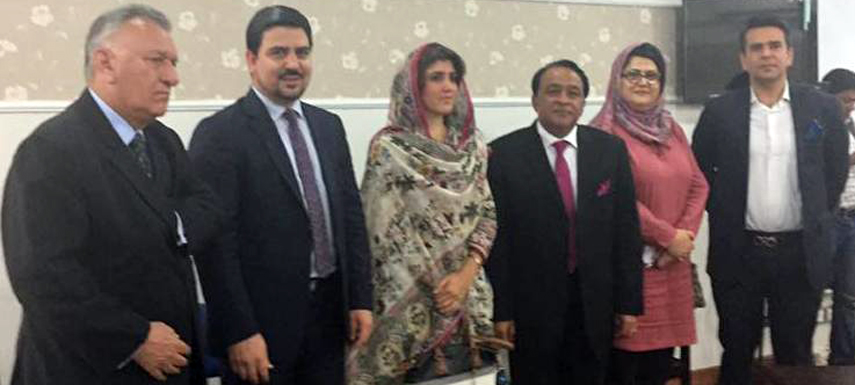During the sixth meeting of the Pakistan Afghanistan Joint Committee held in Islamabad, as part of outreach and university interaction planned for the group, two members each from the PAJC also visited the Quaid-i-Azam University on Thursday, March 30, 2017. The Pakistani speakers were Mr. Qazi Humayun, former Ambassador; and Ayesha Gulalai, Member of National Assembly, while the Afghan speakers were Mr. Mozammil Shinwari, former Deputy Minister of Commerce and Trade, and Ms. Elay Ershad, Member of Parliament. CRSS Executive Director Mr. Aized Ali, Project Director Beyond Boundaries represented the Center for Research and Security Studies.
The four speakers spoke on the theme, “Pak-Afghan Bilateral Relations: Explaining Perspectives” which was followed by an interactive session between the youth including male and female students and academia at the School of Political Science and International Relations auditorium at Quaid-e-Azam University, Islamabad. The programme was hosted and moderated by Rehman Azhar, a renowned TV anchor who hosts the Islamabad Tonight with Rehman Azhar show on Aaj News. The show was aired on Aaj News TV on April 2, 2017. There were more than 90 students and faculty members in attendance, many of whom were Afghan nationals while 60% of those in attendance were female.
Rehman Azhar opened the show by discussing the unprecedentedly escalating tensions between the two Muslim neighbors. He referred to the recent wave of terrorism in Pakistan in February and the allegations that ensued as a result between the two countries culminating in the closure of the Pak-Afghan border. This was an unusual development between the two countries where the trade stopped with trucks filled with goods stranded on both sides. While both the governments instantly realized closing the border was not a good approach and the border was opened recently, the relations between the two countries are still tense.
Following this backgrounder, the host of the show put forward four questions before audience and the PAJC speakers; 1) How should we move forward in the relations between Pakistan and Afghanistan to improve them? 2) Apart from security, what other fields can the two countries cooperate in with each other? 3) How can we mitigate the atmosphere of increasing trust deficit between the two countries? 4) How can the negative perceptions of each other between the Pakistani and Afghan people be ended? He introduced the distinguished PAJC members.
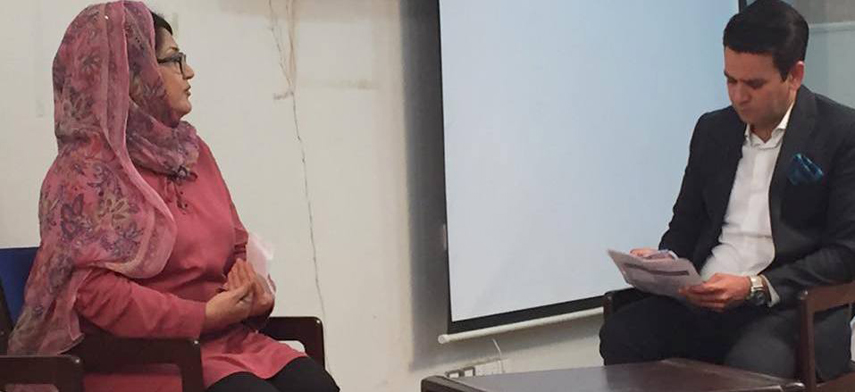 In response to a question by the host, Ms. Elay Ershad stated that she was very happy to see her Afghan brothers and sisters studying alongside Pakistani students in Pakistan. She went on to say that building friendship between the nations of the two countries would not be very difficult. The foremost important thing, she stated, is that both the governments and politicians acknowledge the existence of terrorism and if they will both whole-heartedly make efforts to eliminate terrorists, this will prove to be in favor of both Pakistan and Afghanistan.
In response to a question by the host, Ms. Elay Ershad stated that she was very happy to see her Afghan brothers and sisters studying alongside Pakistani students in Pakistan. She went on to say that building friendship between the nations of the two countries would not be very difficult. The foremost important thing, she stated, is that both the governments and politicians acknowledge the existence of terrorism and if they will both whole-heartedly make efforts to eliminate terrorists, this will prove to be in favor of both Pakistan and Afghanistan.
Ms. Ayesha Gulalai welcomed the Afghan brothers and sisters in the programme and applauded the efforts of the Afghan members of the PAJC for visiting Pakistan during such a tense time to discuss the issues affecting the relations between the two countries. She went on to say that had these discussions been happening at the high level between the two governments, the situation would perhaps not have remained as tense as it is.
Mr. Mozammil Shinwari, former Deputy Minister of Commerce and Trade, stressed that unless trust is restored between the two countries, they cannot build a relationship based on friendship and cooperation. To generate trust, it is required that both countries are honest with each other and extend sincerity towards each other. He said security was certainly an important aspect as the threat of terrorism exists both for Afghanistan and Pakistan. He said “I always believe that if there would be fire in Afghanistan, its heat will reach Pakistan. There is no doubt in that and we have been observing this since not only the last 4 years but rather the last 15 years.” He further emphasized that intelligence cooperation is also very important to defeat terrorism. Trade is another very important field, he said. “In 2009, Pakistan’s export to Afghanistan was at US$2.5bn which dropped to US$1.5bn last year, and I dread that it will fall below even US$1bn this year,” he said. As a result of diminishing trade, he said, there is also a loss of at least 1 to 2 lacs of jobs.
Since the last three to four years, there has been a growing negative mentality in the Afghan people. To prove that their mentality is wrong, it is important to go towards positive things, he said. That is why when speaking to the media or young students in Pakistan, Mr. Shinwari said, he speaks Urdu so he is able to get his message heard by majority of the people. He ended by saying that “I wish to tell both the nations that we cannot live without each other. Hence, we must cooperate.”
Mr. Qazi Humayun, former Ambassador, stated that the issues between Pakistan and Afghanistan have become, unfortunately, more complicated now. The distrust has increased a lot. However, the two countries are so strongly connected that when the trade had stopped for a month, the prices of tomatoes and chickens were low because of an ample supply. While as soon as the border reopened, the prices peaked in Pakistan again, he said. He went on to say that Afghanistan is a landlocked country and while Afghanistan has many supply routes such as through the Chahbahar port in Iran, or via Uzbekistan, Kyrgyzstan and Turkmenistan, the route via Karachi is the shortest for Afghanistan.
“Pakistan and Afghanistan’s relations were so friendly at one time that 5 million refugees stayed in Pakistan and no one raised any voice or said that they were bothered by their presence. Everyone welcomed them. They still continue to live now and we think that if some Afghan refugees were sent back in an inhumane way than the entire civil society protests against their treatment,” he said. However, he went on to say that certain harsh announcements made by the Afghan Government, too, have contributed to negatively affecting the mindsets of the people at the local level in both countries, adding that the media has also played a significant role in that. He also stated that there have been no hostile statements made by the Government of Pakistan at any level. What Pakistan has been wishing to do is engage in talks with Afghanistan, he said.
The floor was then opened for questions whereby the audience raised several questions on the issues of security, terrorism, the Durand Line, Pashtunistan, Afghan refugees, their rehabilitation, the role of India in Afghanistan and the like. In response to a question, Ms. Ayesha Gulailai stated that Pakistan also needs to engage in development projects in Afghanistan like India. While Pakistan has developed two hospitals, the Government of Pakistan needs to engage in more development projects there, she said. Ms. Elay Ershad stated that the Afghan ministry responsible for reconstruction has been ordered by the Afghan Government to arrange for buildings for the refugees to settle in when they return to Afghanistan which has started now. However, she said the issues are those of the refugees’ education and the language barrier. In response to another question, Mr. Mozammail stated that the issue of the Durand Line can only be solved by the Pashtuns on both sides, not the governments or politicians.
During the visit, it was also revealed that more than 50% students from Afghanistan in Quaid-i-Azam University have been studying on scholarships provided by the Government of Pakistan.
The host of the show, Mr. Rehman Azhar, concluded the interactive session by saying that if the two countries sit together to talk, many of their issues will get solved. On the issue of terrorism, he stated, that if the relations between the two countries will continue to be tense, it will only benefit the terrorist groups on both sides.
A university survey was also administered with the participating students and faculty members – post the lectures by PAJC members – to gauge the improvement in their perceptions on the other side; understanding of the challenges of Pak-Afghan relations, and awareness about the socio-political conditions in both countries.
Watch the entire show here.

